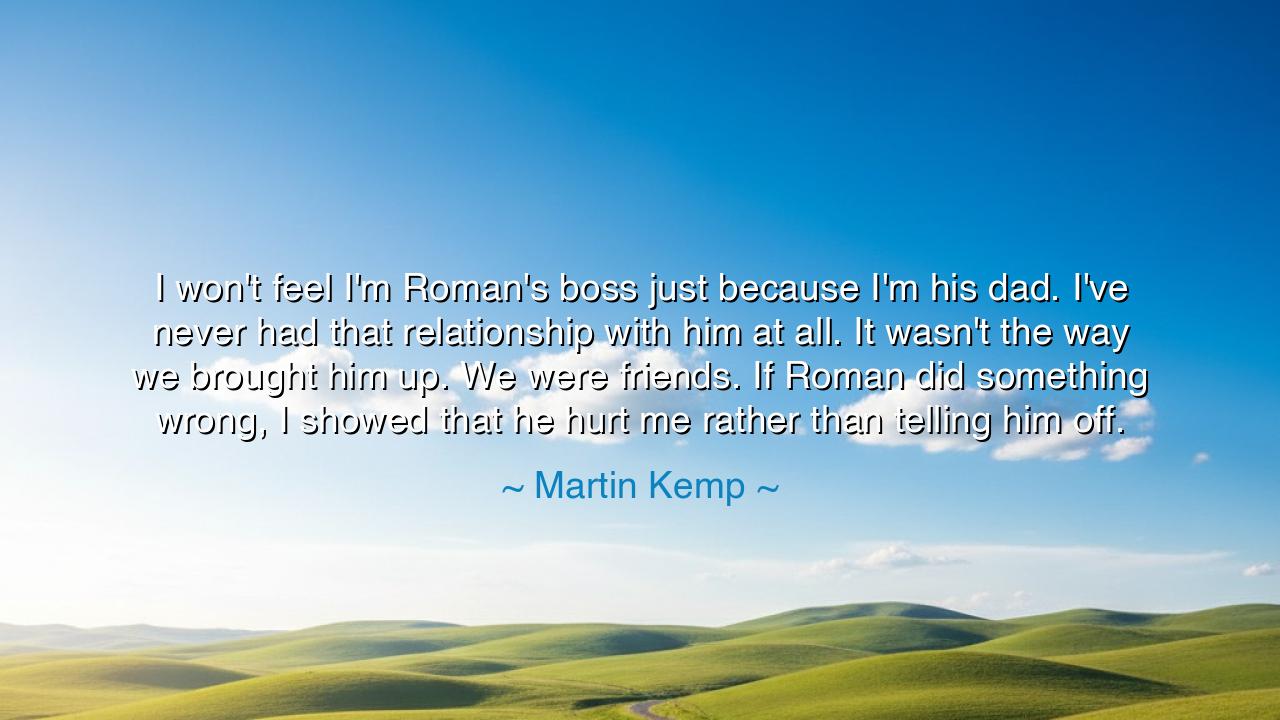
I won't feel I'm Roman's boss just because I'm his dad. I've
I won't feel I'm Roman's boss just because I'm his dad. I've never had that relationship with him at all. It wasn't the way we brought him up. We were friends. If Roman did something wrong, I showed that he hurt me rather than telling him off.






“I won’t feel I’m Roman’s boss just because I’m his dad. I’ve never had that relationship with him at all. It wasn’t the way we brought him up. We were friends. If Roman did something wrong, I showed that he hurt me rather than telling him off.” Thus spoke Martin Kemp, a man whose fame and artistry were matched by his devotion to fatherhood. These words, gentle yet profound, hold the essence of a modern yet timeless wisdom—the art of guiding not through authority, but through affection, not through command, but through connection. In them lives a truth the ancients knew well: that love governs best when it does not rule, and that a father’s strength lies not in his dominance, but in the depth of his understanding.
To those who lived before us, the relationship between father and son was often shaped by duty and discipline. The father was the lawgiver, the stern hand of order in a chaotic world. But Martin Kemp, in his words, reveals a different kind of power—a softer strength that leads by example of heart rather than the lash of command. He speaks not as a ruler, but as a companion on life’s journey. For to be a parent is not to own a child’s will, but to cultivate the soil of their spirit, so that it may grow strong and upright on its own.
In the way of the ancients, one might recall the philosopher Marcus Aurelius, the emperor of Rome, who wrote not of conquest but of conscience. He taught that the greatest leader rules by reason and virtue, not by fear. So it is in Kemp’s approach to fatherhood. He does not wish to be his son’s “boss,” for power gained through fear is fleeting, while love given through respect is eternal. To say “we were friends” is not to abandon guidance—it is to transform it. The father who becomes a friend does not lower himself; he elevates the bond, showing his child that love and accountability are one and the same.
There is great wisdom in his method of correction as well. “If Roman did something wrong, I showed that he hurt me rather than telling him off.” These words reflect a truth both emotional and spiritual: that the conscience of love is more powerful than the fear of punishment. When a child sees that their actions wound the heart of one they cherish, they are moved not by compulsion, but by empathy. This is the education of the soul. The ancients would have called it paideia—the cultivation of virtue not through force, but through the awakening of moral awareness. In such a home, discipline becomes a dialogue, not a decree.
Consider the story of King Philip II of Macedon and his son Alexander, later called “the Great.” It is said that Philip taught Alexander by sharing his dreams, not by imposing his authority. He allowed his son to question, to explore, and to seek wisdom from teachers beyond himself. When Alexander grew to conquer the known world, he did not do so as a man broken by fear of his father, but as one inspired by the example of vision and trust that his father had shown him. Martin Kemp’s relationship with his son carries that same spirit: to raise not a servant, but a friend, not an imitator, but a man capable of standing on his own.
What Kemp expresses, then, is a revolution both gentle and divine: parenthood as partnership. It teaches that respect, when earned through kindness, endures far longer than obedience born of fear. A father who rules may win compliance; a father who loves wins the heart. His words remind us that strength is not diminished by tenderness—indeed, it is completed by it. To show one’s vulnerability as a parent, to let a child see that their actions cause emotional pain, is not weakness—it is the deepest form of truthfulness, and truth is the soil in which love grows.
Let this teaching, then, be carried forward: raise the young not as subordinates, but as companions on the path of wisdom. Teach through your life, not only through your words. When correction is needed, let it come from the heart, not from anger. Let children know the weight of empathy, the beauty of friendship, and the sanctity of trust. For in this way, you will not merely raise obedient offspring—you will raise whole souls, capable of love, conscience, and purpose.
Thus, in Martin Kemp’s humble reflection, we find a lesson for all time: that the greatest fathers are not those who command, but those who connect; not those who demand, but those who inspire. The bond between father and child, when rooted in friendship and respect, becomes unbreakable—stronger than fear, deeper than duty. And in the end, such love becomes the true inheritance—the eternal gift passed from one generation to the next, shining brighter than any name or fortune.






AAdministratorAdministrator
Welcome, honored guests. Please leave a comment, we will respond soon